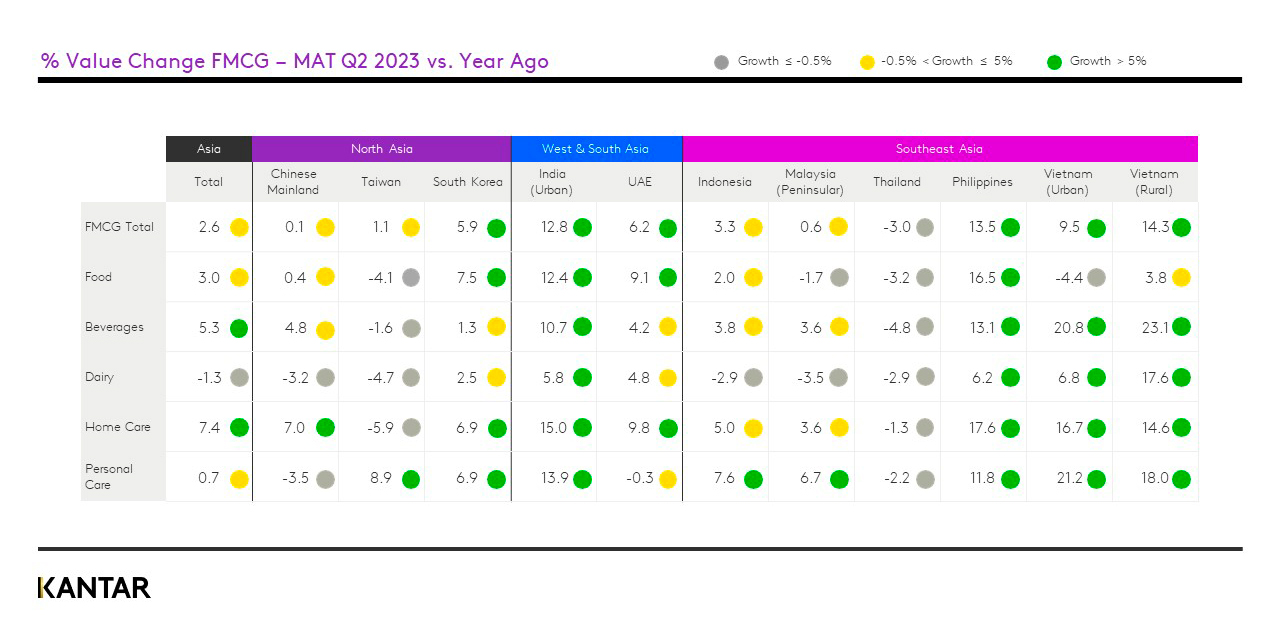During the second quarter of 2023, the FMCG sector in Asia displayed robust value growth of 2.6%. Despite supply chain disruptions and uncertainties across all markets, the industry has demonstrated remarkable resilience.
As we mark one year since the onset of inflation in the region, the latest Asia Pulse report examines how 11 countries have adapted to navigate this landscape. We've observed many trends and transformative shifts that have left a unique mark on consumer behaviour and market dynamics.

Mainland China
The Chinese Mainland's e-commerce landscape continued to evolve steadily, with the highly competitive landscape undergoing accelerated changes. While traditional e-commerce platforms grappled with growth challenges, interest e-commerce expanded rapidly, reshaping how consumers shop online.
Taiwan
With the gradual subsiding of the pandemic, the food service sector in Taiwan saw a substantial resurgence. Conversely, the FMCG food category weakened somewhat. As people resumed social activities, there was a noticeable surge in demand for personal care products, mainly cosmetics. As a consequence, personal care emerged as the primary driver of FMCG growth in Q2.
India
Indian consumers have been increasing the frequency of their shopping trips, predominantly driven by the food and beverages category. The rise in shopping occasions is being led by e-commerce platforms. As a result of making more frequent trips, shoppers have begun experimenting with different brands, leading to a reduction in average pack sizes.
South Korea
The South Korean FMCG market continued to exhibit value growth, supported by an uptick in average prices. Simultaneously, there was a noticeable downturn in volume. However, the decline showed signs of slowing in Q2 compared to the same period last year.
United Arab Emirates
In the United Arab Emirates, a balanced interplay between costs and consumption has seen FMCG purchase volumes increase despite price inflation. Along with a thriving property market and growing demand in the non-oil sector – including FMCG – this trend bodes well for the UAE’s economy.
Indonesia
Indonesia's resilient economy is reflected in the slowing inflation rate, which stood at 3.5%, underscored by steady consumer confidence. FMCG growth during this year’s festive season was at its slowest for five years, but the uplift remains high.
Malaysia
Modern trade, mainly mini markets, grew at a robust pace in Malaysia. These outlets continue to attract shoppers due to their convenience and competitive pricing. The drug and pharmacy channel also experienced significant growth, driven by an influx of shoppers seeking healthcare and wellness products.
Thailand
Within Thailand's in-home FMCG realm, convenience stores have continued to thrive, favoured by consumers for their proximity, enticing promotions, and convenience. Conversely, local channels experienced a decline – partly due to the absence of government support programmes during the pandemic.
The Philippines
The Philippine economy maintained its upward trajectory, albeit at a slower pace compared to the previous quarter. This deceleration coincided with higher inflation, which reached 7.6% in March 2023. Although inflation rates have shown signs of softening, consumers remain cautious in their spending habits.
Vietnam
Vietnam's GDP grew by 4.14% in the second quarter of 2023, a relatively modest rise. Inflation rates started to cool down; however, retail sales growth slowed as some consumers grappled with rising living costs, which impacted domestic demand.
The Asia Pulse is a comprehensive quarterly report meticulously curated by Kantar Asia's Worldpanel Division. This latest edition offers a dive into the ever-evolving Asia-Pacific markets, and is brimming with invaluable insights. Download the full report via this link or by filling the form below.

